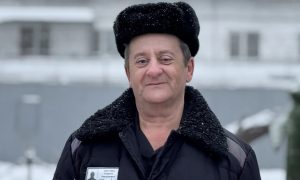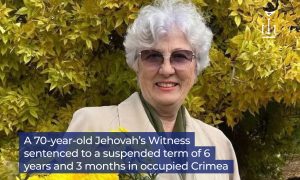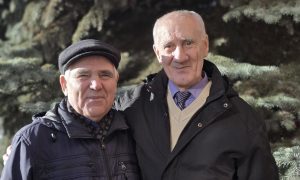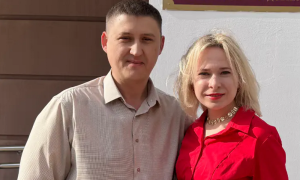MOSCOW (Reuters) – When armed Russian security officers forced their way into Alexander Kalistratov’s home, he hardly imagined they were after his books.
The local leader of a congregation of Jehovah’s Witnesses in Siberia now faces up to two years in prison if found guilty this week of inciting religious hatred for distributing literature about his beliefs.
“They swept everything from my shelves without even bothering to sort it, even my bible,” Kalistratov, a street sweeper, said by telephone from the Siberian town of Gorno-Altaysk, 3,600 km (2,200 miles) east of Moscow.
His trial is the first of a dozen pending against Jehovah’s Witnesses and scores of others caught up in the widening net of criminal prosecutions brought under Russia’s anti-extremism law.
Rights activists say the vaguely worded legislation, first passed in 2002, is increasingly being exploited by the authorities to persecute religious minorities, intimidate the media and clamp down on opposition activists.
“This law is used by various officials for their own personal aims,” said Alexander Verkhovsky, whose SOVA rights group monitors hate crimes, extremism and religious freedoms.
“In practice, it’s a universal tool. It can be used to target anybody … political, religious or even completely apolitical groups such as labor union activists.”
The law — ostensibly aimed at combating potential terrorist threats — was used earlier this year to fine two prominent Moscow curators a combined 350,000 roubles ($11,300) over an controversial Pop Art exhibition in Moscow and to impose a ban on the popular Internet portal YouTube in Russia’s Far East.
ORTHODOX CHURCH PRIVILEGED
In the case against Kalistratov, activists say local authorities are really aiming at cracking down on groups that are frowned upon by the Russian Orthodox Church.
The Church has undergone a revival since the fall of the Soviet Union ended decades of repression under Communism, and has traditionally occupied a privileged place in Russia, with strong ties to the state.
It has repeatedly complained that other churches are poaching converts in its territory.
“I have no doubt this is a centralized campaign,” Verkhovsky said. “Some high-placed leader has given the order to persecute a particular group.”
Prosecutors can move fast to outlaw texts, which are then included in the Federal List of Extremist Materials — an ever-growing catalog that ran to over 50 pages in its latest print version.
The ban on Jehovah’s Witnesses’ basic texts has spurred over 150 police detentions and searches in a three-month period alone, according to SOVA.
“We remember what happened to Jehovah’s Witnesses in the Soviet-era, in the 50s, when some 1,000 were exiled to Siberia. Now it seems this is all being repeated,” said Grigory Martynov, a spokesman for the group, which has about 162,000 followers in Russia.
Moscow-based religious affairs analyst Geraldine Fagan said innocuous material was being defined as extremist.
“In some cases, it’s quite farcical,” she said. “If the texts say that their faith is the best or the truest, then that is understood as extremist. But that is an integral part of any religion, so it’s particularly disturbing.”
Prosecutors typically seek out an “expert review” and submit the material to a local court, but analysts say the reviews are slanted, courts are pliable, and higher courts rarely overturn their decisions.
Testifying on Kalistratov’s behalf in early hearings, Mikhail Odintsov, an official working for Russia’s rights ombudsman, slammed the expert analysis on which prosecutors based their case as “wholly unscientific.”
“Reliance on such expertise is fraught with repeated miscarriages of justice and may prove a detonator of mass violations of human rights in Russia,” he told the court.
Source: http://ca.reuters.com/article/topNews/idCATRE6BF17U20101216





